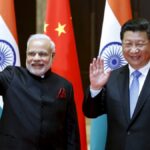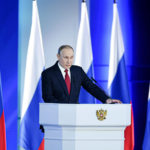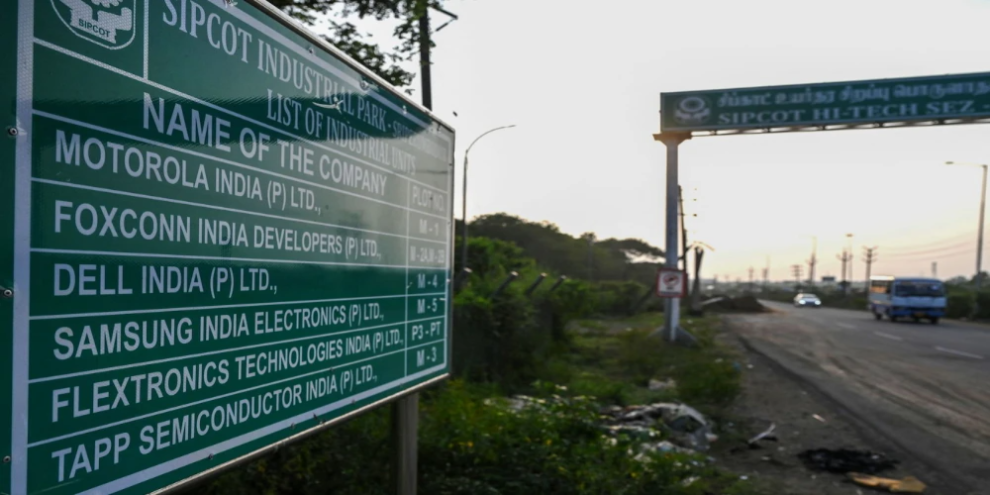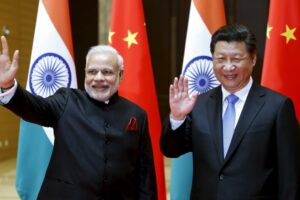The highlights this week: Major Apple supplier Foxconn backs out of a joint venture to set up semiconductor plants in India, EU and U.S. officials visit Bangladesh with January’s election on their minds, and Indian Prime Minister Narendra Modi heads to Paris.
India Gets a Tech Reality Check
This week, Taiwanese electronics maker Foxconn, a major Apple supplier, pulled out of a joint venture with Indian conglomerate Vedanta to set up semiconductor plants in India. The project—which was announced last year—was planned for Gujarat, the home state of Indian Prime Minister Narendra Modi, and he had touted it for its potential to create jobs and spur economic growth.
To observers, the short-lived venture looked like an opportunity for Apple to pivot more of its production toward India and away from China. Foxconn’s reversal is not only politically inconvenient for Modi, but also a setback for New Delhi’s strategic goals. Perhaps most importantly, it serves as a reminder that for all of India’s recent successes in positioning itself as a global technology player, it still has much work to do—especially when it comes to addressing private sector concerns.
Intensifying competition with China has prompted the United States and some of its partners, including Australia and France, to strengthen tech cooperation with India. A key goal is to diversify global supply chains for emerging and critical technologies, reducing the world’s dependence on factories in China. The Foxconn venture intended to leverage India’s strengths in chip design and research and boost its production capacity.
Technology has already become a major focus of the U.S.-India relationship. After Modi’s state visit to Washington last month, a joint statement proclaimed that technology “will play the defining role” in deepening bilateral ties. Modi’s visit produced new tech deliverables, from a defense innovation platform to an agreement to transfer U.S. jet engine technology to India—a move that U.S. officials privately described as a first.
Recent months have also brought a memorandum of understanding on semiconductors, as well as the Initiative on Emerging and Critical Technologies, which aims to reduce the bureaucratic inertia that has doomed previous bilateral tech collaborations between Washington and New Delhi. Technology has also become a focus of U.S.-India multilateral engagement, including through the Quadrilateral Security Dialogue and the Indo-Pacific Economic Framework.
The private sector has embraced India’s growing tech capacity and hopes to enhance it. Just look at General Electric, the company transferring jet engine technology to India; Apple, which opened its first retail store in India in April; or the social media companies attracted to India’s tech-savvy, young population. Still, Foxconn’s decision to back out suggests that for all the surging momentum for India’s global tech cooperation, there may be some bumps along the way.
Indian officials have downplayed Foxconn’s move, insisting that the company remains committed to semiconductor investments in India—a message Foxconn reiterated on Tuesday, describing its pullout as part of the growing pains that accompany investing in a “new geography.” However, the reported reasons for the decision include cost concerns and the refusal of a third multinational company, STMicroelectronics, to play a greater role in the project. This all suggests differences with India that need to be addressed.
As defense expert Abhijit Singh recently explained, U.S. defense firms remain cautious about transferring technology to India for reasons ranging from cost to concerns about intellectual property rights. Some tech firms are uncomfortable with India’s data localization policies, which aim to give New Delhi more control over data management, although new Indian legislation has addressed some of these concerns. Others are unhappy about India’s attempts to suppress content critical of the government.
The U.S.-India tech partnership boasts mechanisms that allow the two sides to work out lingering differences on tech policy. For example, the Strategic Trade Dialogue, launched in June, focuses on surmounting long-standing obstacles posed by export controls. New Delhi could benefit from private sector equivalents of these arrangements, which would enable regular troubleshooting with the leaders of foreign companies investing in India’s tech sector, or at least exploring it.
What We’re Following
EU, U.S. officials in Bangladesh. Bangladesh’s national elections are still months away, but they are already bringing high-level visitors. An EU election exploratory mission arrived in Dhaka on Saturday for more than two weeks of meetings with government officials, election commissioners, security forces, civil society representatives, and foreign diplomats. The visit will inform whether the EU will send an election observer mission for the January polls.
Meanwhile, two senior U.S. officials are also in Bangladesh this week: Assistant Secretary of State for South Asia Donald Lu and Uzra Zeya, the top human rights official at the U.S. State Department. U.S. officials have privately underscored the importance of a free and fair election in Bangladesh, suggesting that changes in U.S. policy can be ruled out if the United States concludes that the election is rigged.
The Biden administration is trying to create strong incentives for Bangladesh to run a clean election. In May, U.S. Secretary of State Antony Blinken announced a new policy that would impose visa bans on anyone who hinders free and fair elections in the country.
Lu and Zeya will likely deliver a clear message: Washington values its ties with Dhaka and hopes to see improvements that ensure the partnership continues to grow. Bangladesh, which has sharply criticized the heightened U.S. focus on democratic backsliding in the country, may not react favorably.
Modi visits Paris. France is the latest Western country to roll out the red carpet for Modi. After a trip to Canberra in May—which featured Australian Prime Minister Anthony Albanese likening Modi’s popularity to Bruce Springsteen’s—and the state visit to Washington last month, Paris welcomes the Indian premier on Thursday and Friday.
Modi’s France trip will feature agenda items similar to those that figured in during his meetings in Australia and the United States: defense, technology, and clean energy. Modi will also be the chief guest at a Bastille Day parade on Friday—a comparable honor to the one India bestows on a chief guest at its Republic Day parade each January. While India invites a visiting dignitary each year, France does so less frequently.
U.S. officials will be watching the visit closely. Despite a dust-up over the 2021 AUKUS nuclear submarine pact that replaced a French submarine package to Australia, the United States and France largely see eye-to-eye in the Indo-Pacific region, including on India playing a key role in countering China. France is also one of the top defense suppliers to India, and the United States likely hopes any new deals will send a message that Western partners are prepared to help wean India off Russian military support.
Court upholds Gandhi’s conviction. A high court in the Indian state of Gujarat upheld the conviction of Indian opposition leader Rahul Gandhi on July 7, ensuring that he remains disqualified from politics as national elections approach next year. In March, Gandhi was sentenced to two years in prison on defamation charges related to 2019 comments that referred to Modi as a thief. Gandhi’s prison sentence is currently suspended, and he plans to appeal to the Supreme Court.
Despite his legal troubles, Gandhi has sought to energize his Indian National Congress party, which has struggled in national elections for nearly a decade amid the popularity of Modi and India’s ruling Bharatiya Janata Party (BJP). Late last year, Gandhi staged a march across India to promote unity and tolerance, and he has used public appearances during visits to the United Kingdom and the United States to criticize the BJP. His efforts may have paid off: Congress won by a landslide in a state election in Karnataka in May.
Under the Radar
Indian Defense Secretary Giridhar Aramane made a two-day visit to Myanmar this month. According to the Indian readout, the trip focused on cross-border security concerns, including smuggling and narcotics trafficking. But the agenda may also have focused on cross-border violence: Insurgent groups in the Indian state of Manipur have a presence in Myanmar.
It’s likely that Aramane’s visit aimed to work with junta officials to ensure that militants, smugglers, and other nonstate actors in Myanmar that pose a threat to India won’t exploit ongoing ethnic violence in Manipur to ramp up activities in India. Some reports indicate that cross-border drug smuggling has increased since the unrest in Manipur began in May.
These are delicate discussions for India, which is keen to prod Myanmar to address its concerns—but not in a way that could antagonize the regime, which took over in a 2021 coup. India, which is a top arms supplier to Myanmar, still seeks workable relations with the junta to aid border security and potential connectivity projects; it doesn’t want the country to become fully reliant on Chinese economic and military support.
Regional Voices
In Dawn, journalist Zofeen T. Ebrahim argues that Pakistan’s large young population suffers from education and health challenges that may undermine potential demographic benefits. “Our leaders have been telling us that our youth bulge … is our demographic boom,” she writes. “The government needs to abandon spinning this tale about the population dividend.”
Researcher Sabbir Ahmad writes in the Daily Star that Bangladesh’s state and society can collaborate to combat the country’s “persistent problem” of littering. “The government, businesses, and society as a whole, must work together to reduce the impact of waste on public health and protect our ecosystem before it is too late,” he writes.
A Nepali Times editorial laments that democrats, not demagogues, are weakening democracy in Nepal. It calls for electoral reform: “Our problem is different [from that of countries with populist leaders]: politicians who have struggled, suffered and sacrificed their lives for the restoration of democracy are the very ones undermining it.”
Source : Foreign Policy
















